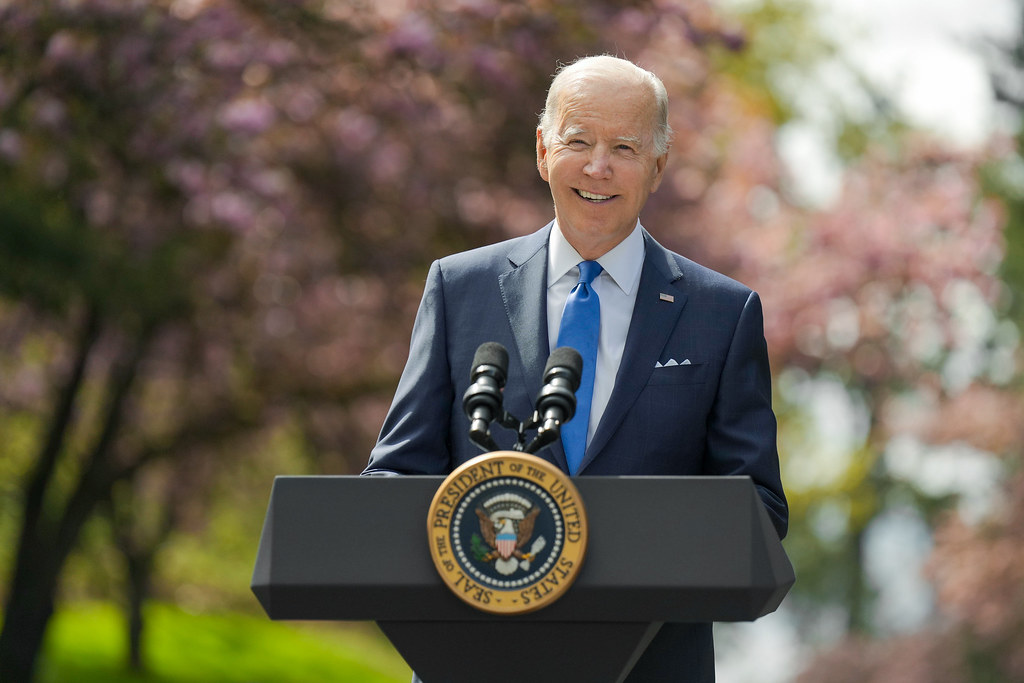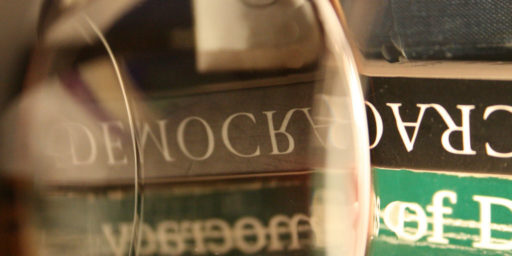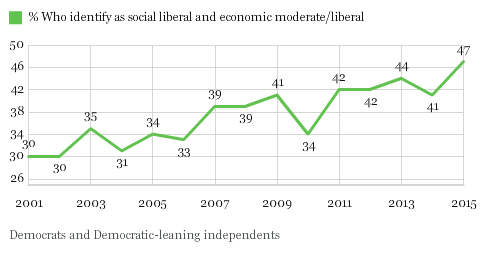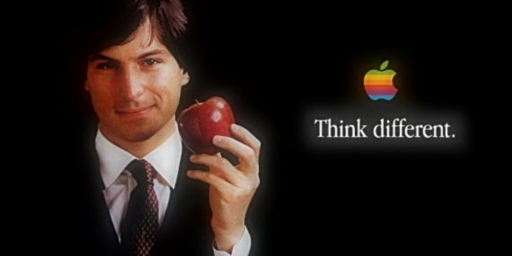The Messaging is Medium
The Democrats have lots of problems. Salesmanship is pretty far down the list.

Apropos of some recent discussion here, The New Republic‘s editor, Michael Tomasky, writes “Yes, Democratic Messaging Sucks. But It’s Harder to Fix Than You Think.”
[L]et’s acknowledge three structural difficulties Democrats face that Republicans don’t. These are rarely discussed or acknowledged, especially the first two. But they are fundamental to why Democrats have a harder time articulating a clear message.
Structural difficulty number one: There just aren’t as many liberals as there are conservatives in the United States. Gallup asks people this question most years. In the 2020 edition, 36 percent of respondents called themselves conservative, 35 percent moderate, and 25 percent liberal. And that 25 is way up from the 1990s, when the liberal number was around 17, 18, and the conservative number was more like 38. (Understand Bill Clinton a little better now?)
When I was considerably more conservative than I am now, I believed that to be true. For quite some time, though, I’ve seen these responses as meaningless, if not misleading. For much of the period of my political awareness, which roughly coincides with the rise of Ronald Reagan, “liberal” was a dirty word while “conservative” had positive connotations. But that really doesn’t tell us much about policy preferences. Relatedly, almost by definition, “conservative” is a floating concept. Positions on, for example, race relations or the role of women in society that were essentially fringe-level leftism in 1970 are conservative, if not reactionary, now.
This never-discussed fact explains a lot. It means that Democrats have to do a lot more reaching beyond their base than conservatives do. And it helps explain why Republicans are constantly trying to out-conservative one another and Democrats, with very rare exceptions, never even use the word “liberal.” This exasperates me to no end, but seeing these numbers, I can kind of understand it. If those numbers were reversed, Democrats would be saying liberal this and liberal that all day, and conservatives would be all hamina-hamina at candidate forums when the moderator asked them if they’d call themselves conservative.
Again, though, “liberal” simply got rendered a bad word and was eschewed. Rather obviously, Joe Biden is more liberal on just about every meaningful level than Jimmy Carter was in 1976 and 1980, Walter Mondale was in 1984, and so forth. Indeed, he’s almost certainly more liberal in his rhetoric and policy proposals than either Barack Obama or Hillary Clinton. The fact that he calls himself a “moderate” is branding, not a meaningful descriptor of his ideology.
Structural difficulty number two: Not quite half of Democrats are liberal. Here’s a Pew result from early 2020 in which Democrats and Democratic-leaning independents were asked their preferred ideological label. Leading the pack? Moderate, 38 percent. Liberal came in at 32 percent, very liberal at 15 (way up from the single digits 20 years ago), while conservative and very conservative combined for 14 percent (conservative Democrats tend to be more religious). Compare to Republicans: In most surveys I’ve seen, about two-thirds of Republicans, maybe even 70 percent, say they’re conservative, with most of the remainder moderate, and a very confused 4 percent or so liberal.
Mull those numbers. There are roughly as many conservatives in the Democratic coalition as there are “very liberals.” That Republicans are overwhelmingly conservative makes their messaging challenges much easier to surmount. It also means, and this is a very important point, that there’s no divide between the GOP base and the political class, which is obviously not true of Democrats. The Democratic political class is, for the most part, very liberal, which means that the political elites embrace a number of cultural left positions that aren’t even particularly popular among the Democratic rank and file, let alone independent voters. (Economically populist positions, however, are popular, as evidenced by how well the constituent elements of Build Back Better polled.) Again, these numbers are very under-discussed in our discourse, but they explain a lot.
At the risk of beating a dead horse here, this is mostly labeling, not ideology.
Still, he’s adjacent to a point here: the Democratic coalition is larger and more diverse than the Republican coalition. As the parties have sorted, the GOP has become the party of the white working class and older folks, primarily in the suburbs and rural areas. Meanwhile, the Democratic Party has continued to be a coalition of urban dwellers; Blacks and other minority groups; and, increasingly, the college-educated. Mobilizing a smaller, more cohesive group is indeed easier.
In particular, as the 2020 Democratic primaries demonstrated, the interests and priorities of urban, college-educated whites and Blacks are often wildly divergent. The former are pretty uniformly progressive whereas the latter tend to support the welfare state but fairly conservative on social issues.
Structural difficulty number three: The Republican message is just a lot less complicated. Democrats have a lot of things they want to do. But Republicans have nothing they want to do, except cut taxes, end regulations, crush the libs, and maintain power by any means necessary. You’ve heard the term “elevator pitch”? A Republican could give you his party’s elevator pitch in the time it takes to go from the lobby to the third floor. With a Democrat, you’d need to go about 40 floors and they still wouldn’t be finished. The way the media are today, dependent on soundbites dumbed down to a few seconds, simple (and stupid) get through much easier.
The former longtime Republican in me laughs at this. The Democratic message can be summarized, with tongue only partly in cheek: “Free everything for everybody paid for by taxing the rich.”
Again, though, Tomasky isn’t totally wrong here. To the extent the goal of the Republican Party is to cut taxes and federal programs not related to national security, it’s a pretty easy message. More importantly, it’s much easier to achieve those goals in the minority, since obstructionism is good enough to at least keep new programs—and, indeed, budgets—from passing.
Still, he’s confusing the agenda of the policy wonks with that of Democrats writ large. “Medicare for All,” “free, universal college,” and the like are easy to explain and to sell. It’s just that, when one gets into the details, those programs simply aren’t that popular even within the party.
These three factors combine to make Democratic messaging a lot trickier than Republican messaging. But having said all that, Democratic messaging is still pretty lame. As I said above, it’s unimaginative (when’s the last time you heard a major Democratic politician say something that really surprised you, made you sit up and take notice?), and it’s defensive (Republicans are almost always setting the terms of debate, and Democrats are reacting, as in the way they let Build Back Better be framed as a huge government spending bill). Democrats are also inconsistent. The Biden White House has blamed inflation on everything from supply chains to corporate profit-hoarding to Vladimir Putin. All are culprits to some extent, but it’s just not very good messaging to jump from this to that.
I’m honestly not sure what to do with this. First, even though I was still voting Republican, I’ve been lamenting that the party really hadn’t come up with interesting new policy ideas since Reagan’s first term. I guess the 1994 Contract with America had some modest innovations but they were mostly just mechanisms for achieving the unfinished bits of the Reagan agenda. Second—and contrary to the argument Tomasky has been making in this column—Bernie Sanders, Elizabeth Warren, Andrew Yang, Pete Buttigieg, AOC, and others have been putting out some pretty bold ideas and calling them “progressive.” I don’t know that any of them have surprised me—things like a universal basic income were being floated by the Nixon Administration, after all—but they’re not simply rehashing the Clinton and Obama agenda, either.
It’s true that Biden and company are giving multiple explanations for inflation. But that’s because there are multiple, overlapping reasons for why we’re experiencing inflation, not because they suck at messaging.
Because of their agenda, because of some of the things they want government to do, Democrats have to educate and inform voters in ways Republicans just aren’t required to undertake. Take the issue of monopoly power. Everybody knows basically what a monopoly is. Everybody knows that Teddy Roosevelt busted the trusts, and most people agree that that was good (actually, Woodrow Wilson and Louis Brandeis did more than T.R., but whatever). So people have that basic knowledge that makes them receptive to the Biden position.
But nobody knows how prevalent monopolies are. Nobody knows that we literally never go a day, or most of us a few hours, without having to deal with a monopoly or oligopoly, and nobody knows how they set prices and wages and distort the economy and hurt small businesses. Nobody knows that small cattlemen and chicken farmers are squeezed to death by giant corporations. Biden did criticize the meat-packing industry one time, as I recall. But why isn’t he out there in rural Maryland or his home state of Delaware doing an event with chicken farmers? When’s the last time you saw a prominent Democrat (outside Iowa caucus time) standing alongside a bunch of farmers? That would cut against the stereotype and get people’s attention—and it would educate people about the extent of the problem in an emotionally compelling and nondidactic way.
This is . . . an incredibly niche issue that even the average Democratic wonk doesn’t care about. We’ve been hearing about the plight of small farmers since I was in high school. Willie Nelson, John Mellencamp, and others started Farm Aid way back in 1985. Frankly, so long as meat is plentiful and cheap, nobody cares.
It would do something else that too many Democrats seem afraid of doing: It would name an enemy (agribusiness). Republicans name specific enemies all the time. Democrats rarely do. Democrats love being aspirational, but most of them shy away from being confrontational. Elizabeth Warren and Bernie Sanders (who is not technically a Democrat) do it all the time. A few House Democrats from safe districts do it. Biden actually does a lot more of this than Barack Obama did; he’ll talk some smack on corporations and the wealthy, albeit usually without naming any specific names.
He should. They all should. Like it or not, people know you by the enemies you’re willing to make. Why don’t they, for example, talk shit on Mark Zuckerberg? Nobody likes Mark Zuckerberg. In poll after poll, 60 to 70 percent of people want Big Tech to be broken up. It’s a safe position. So why don’t they do it, or at least talk about? The answer in this case probably begins with “political donations.” But it’s more than money. It’s psychological. Democrats simply give the impression of being afraid of a fight. They want to be the party of comity. Even Biden is still trying to give Republicans a path to redemption in this regard.
It’s a weird fantasy of partisan pundits that the other side is more effective because they’re more ruthless and shameless. But the notion that Democratic politicians don’t call out enemies just isn’t true. Everybody from Big Oil to Big Pharma to Walmart to Amazon to Facebook get hammered. Hell, even lovable Jimmy Carter got a windfall profits tax passed on the evil oil companies. And, goodness, how many times has Zuckerberg been hauled before Congress by Democrats?
I submit that this kind of approach will help address the structural problems I laid out above. Democrats across the ideological spectrum—from the conservatives to the very liberal—will respond favorably to a politics that emphasizes the idea, “We’re against the powerful interests that are scheming against you.” If people see liberal politicians taking creative and brave stands, we might even bump that liberal number up above 25 percent, since liberalism will stand for something positive again to your average person. This kind of politics can also slice through the media chatter: Republicans understand that the media loves conflict, so they serve up some new ones every week. The public always knows who the GOP is mad at, and they don’t pay a price for being the “angry” party.
We don’t know if Biden will run in 2024. He often looks tired. But I’ll say this for him. He is more unambiguously on the side of working people than any Democratic president in a very long time. He’s an old-school, Truman-type Democrat. He and his team need to do more to show it.
On that front, perhaps, there is an actual messaging issue. It’s quite likely that Biden’s programmatic agenda would be more beneficial to the white working class (assuming he could get it passed with Joe Manchin in the way) than Donald Trump’s was. Certainly, he tried to make that case. But Trump did a much better job of playing to their emotional fears and resentments.
Finally, to re-emphasize a constant theme here, one can’t take this conversation entirely on its own terms. Messaging matters. Biden did a better job of it in 2020 than Clinton did in 2016—and a worse job than Obama did in 2008. But the institutions by which we elect our representatives and enact public policy are horribly skewed in favor of rural voters.
Democrats have won the popular vote in 7 of the last 8 Presidential elections. The one exception, 2004, was by a small margin and arguably only happened because George W. Bush, who won the Presidency pursuant to the 2000 election despite getting half a million fewer votes than his Democratic opponent, had the advantage of incumbency. But, of course, Trump won the 2016 election despite getting 2 million fewer votes than his Democratic opponent.
And, even when they win office, Democratic Presidents have an uphill fight passing their agenda. Not only is the Senate, especially, skewed in favor of Republicans but the institution’s rules make it very easy to obstruct. Even with a filibuster-proof majority (albeit only briefly and because of the defection of a Republican), getting ObamaCare passed took every parliamentary trick in the book and was the only major legislative achievement of eight years in office.






Umm…. have you been to the grocery store lately? Meat prices are up 50%-100% from two years ago, and there’s plenty of stuff you can’t get (or can’t get much of).
The UK is having its worst inflation in almost 40 years
Someone explain to me how that’s Joe Biden’s fault.
@Mu Yixiao: Oh, I’m aware. But, as with the massive spike in gas prices, it’s recent. And because of global supply chain issues, not because family farms have been rendered obsolete.
@EddieInCA: Obviously, inflation in the UK is Boris Johnson’s fault. That’s why he barely survived a No Confidence vote yesterday. (Obviously, snark. But it’s simply a fact of life that voters blame politicians for bad things.)
I think you’re misunderstanding the point on this one. It’s not about the plight of small farmers. It’s about a) the pocketbooks of shoppers throughout the country and b) showing rural businesspeople (farms are businesses–with lots of capital investment and economic impact) that democrats give a rat’s ass about them.
Depending on which maps you look at there are roughly a dozen purple states in the US–most of them have significant rural/farm segments to them. Biden sitting down and having a cheeseburger and a beer (followed by a slice of Door County cherry pie) with area farmers and discussing what the Dems can do to ease restrictions and open the markets to them would be great messaging.
“Hey. I know prices at the butcher shop are high. Here’s what we can do to provide better opportunities for small businesses to process and distribute local meats to local customers–without loosing any of the safety regulations we have in place.”
I complain enough about your posts, James, that I have to give you an attaboy on this one. Not gonna say I agree 100%, but overall this is pretty good. I get tired of the folks who believe there’s a magic message that Democrats could win with if they’d only use it.
That said, I do think there are things they might do and will write about it someday in a post that keeps building in my head.
My paraphrasing of the bulk of American voters when shit isn’t going well:
ETA: yes, this is an oversimplification.
There’s an over-dramatized* bit near the beginning of Redshirts (meh), where the captain of the Intrepid, most dramatically refuses to accept moral exoneration from one of his senior officers over the death of a junior officer, by saying “Not my fault. But my responsibility.”
IMO that’s the view of most people regarding the president/PM/king, even when they have nothing to do with causing the problem and can’t, for whatever reason, do much, if anything, about it.
“Messaging” to some extent seems to mean “finding someone, anyone, else to take the blame and make it stick.” This was Benito’s MO in dealing with the trump virus: blame China for it. This didn’t quite work, but it managed to keep people distracted for a while.
That’s also the intent behind most GQP “messaging.” Things suck for you because blacks/illegal immigrants/LGBTQs/foreigners/socialists/communists/democrats/liberals/etc. Unsaid: not because the obsession with capital accumulation has rendered you a cost line item in a corporate spreadsheet, and costs have to be kept down.
*That scene is overly melodramatic on purpose.
@Mu Yixiao:
Grain prices are up, this affects meat, eggs etc. Lots of global grain supply disruptions, weather, wars etc.
There are three raw materials to make nitrogen fertilizer – air, water and fossil fuel, natural gas preferred. Only one of these costs significant money, and its price is way up globally also.
Are you having fun? I really hope you’re having fun.
One of the jobs of the modern presidency is communication. We elect a spokesman as much as a set of policies.
The Republicans have been doing this way better than the Democrats at pretty much every point in my life. There’s a structural disadvantage to having to communicate big ideas, and get the corporate media to focus on them, and to deal with the hostile network with massive reach that is Fox. It’s a hard job, but no one ever said it was going to be easy.
It’s why I think we should be nominating George Clooney, whether he wants the job or not. Obviously, I’m not entirely serious about that, but we need to push more in that direction, rather than caring so much about which version of universal, single-payer health care the candidate will fail to enact.
That’s because we don’t state our values enough. We should be tying everything back to this — Equality And Opportunity For All.
Medicare For All — frees individuals to change jobs, start companies, pursue their dreams, and make America a stronger place.
Student Loan forgiveness — The middle class is sliding backwards, we need to take a burden off our young people so they can have the opportunity to succeed. Make damn sure trade schools are included.
Gun control — everyone should be able to go to the grocery store without a stupid Wild West shootout.
Queer rights — yes, even faggots are part of everyone.
Child tax credit — I don’t know, work something out.
Is it free ponies for everyone paid for by the rich? No, it’s restoring the middle class and extending that opportunity to everyone — those who have been traditionally excluded and those who have been recently excluded.
@Gustopher: Ha. I’ve done a lot of cleaning up under the hood, consolidating categories and tags, lately. There’s a plug-in that automatically tags them for me and I figure I might as well let it tag every mention of these terms. Otherwise, it’s just too labor intensive to do it manually with something approaching 60,000 posts in the archives.
@Gustopher: But most of those things are easy to sell. It really is free stuff paid for by the rich.
Medicare is wildly popular. Bringing everyone under it would be expensive but cheaper than what we do now. But guys like Bernie want to couple it with ending private insurance—which is not only wildly UNpopular but would screw up Medicare.
I think free community college is a way easier sell than loan forgiveness, which is mostly a giveaway to the well-off with no obvious benefit to the two-thirds of taxpayers who never went to college.
Most people support gay rights in theory but many, including large swaths of Black and Latino Democrats, are uncomfortable with having the schools talk about it with young kids.
Gun control is fairly popular in theory but not on many specifics.
@James Joyner: I’m just saying that Democrats do a poor job of tying these back to our core values, and repeating our core values (which I claim are equality and opportunity)
It leaves the Democratic agenda sounding like one thing for each part of the coalition, rather than a comprehensive vision for America that includes everyone.
(Also, we’re America, we don’t pay for things…)
This is exactly the “what type of universal health care will we fail to enact?” issue. The answer is always “we will do what the 50th most liberal Senator, possibly 60th, will get on board with,” so quibbling over the details is a bit pointless. Not that we don’t desperately want to quibble over details, because the details are so juicy to us.
I think, James, you’re presenting this as an oversimplified view you’ve at least partially given up. It seems to be exactly how Koch, the Mercers, the Uihleins, Theil, and the rest of the Billionaire Boys Club who make up the GOP donor base see it. It’s a testament to human decency and rationality that there are a number of wealthy people like Soros, Bloomberg, Steyer, and others who have, perhaps, a more sophisticated view and support Dems.
@Gustopher:
But you think that because they don’t win enough. But, as James notes, they have won the popular vote for president 7 of 8 times.
So is the problem their inability to share their message or is it something else?
@Steven L. Taylor: The institutional problems with the electoral college aren’t something Dems can change right now. They suck, but they are not going anywhere.
Meanwhile, Democratic policies poll better than Democrats do, and a large chunk of the country gets right wing propaganda instead of news, so they aren’t even hearing the Democrat’s message. Both are spots where we could feasibly do better without constitutional amendments.
If we don’t think that Democrats can do better with messaging — including setting the agenda — then we should either all be figuring out how to live under an autocracy, or spend out time learning how to shoot guns and begin polishing the guillotines for the revolution.
I remain optimistic (or fat and lazy) enough to think we don’t need guns and guillotines.
The content of a message is often less important than the way it’s delivered. The media is abuzz today with reports of a speech by Matthew McConaughey about gun law reform. Did he say anything different to what the president has said? Not really. But he said it in a way that had more impact, because he appealed to people’s emotions.
Say what you will about the former guy, his messaging went straight to Americans’ gut instincts. Ditto all the Trump Republicans who regularly get invited to appear on radio or TV or get quoted in written media. Bernie Sanders did so well in his presidential runs not because his supporters critically analysed his policy ideas, but because he had passion! Trump Republicans often say they support him because he fights, even if he loses. I imagine Bernie’s and AOC’s supporters say the same thing about them.
Similar observations apply to media personalities. The right has Carlson, and Hannity, and all the rest of the Fox crew; it has Shapiro and Kirk and the CPAC circus and the Trump boys and a host of other colorful representatives who can cut through the noise to get a message across, no matter how much one might despise its content. The left has James Carville, Ruy Teixeira and a bunch of other “analysts” explaining why the Democratic party is doing everything wrong.
Democrats by and large are a colorless lot who simply fail to inspire much in the way of positive emotions. Incredibly, the public face of the January 6 committee has become Liz Cheney. I expect about one American in 100 could name the committee chair. Who ever got moved or inspired listening to Nancy Pelosi or Kamala Harris or Chuck bloody Schumer? Biden manages to appeal to the feelings a bit, but within a narrow range. Most of the rest sound as if their principal objective is to avoid offending anyone.
I don’t know how Democrats can overcome this problem, which is partially caused by the fact they are led by people still reluctant to step aside and let those impatient Boomer kids show what they can do. But until they can find a way to recapture the excitement of Clinton and JFK and Obama, no amount of tinkering with the message’s content is going to overcome the insipid ineffectiveness of its delivery.
If Democrats have a problem with messaging, it is really about the way they communicate. They talk over and above the average person. They often employ academic jargon, using made up words or terms, and only end up scoring points with the highly educated and verbose talking crowd. James Carville was on point when he said Democrats need to start talking Yiddish instead of Hebrew. The funny thing is his stated observation was a well-educated Southerner’s talking point. Instead, he just needed to simply advise Democrats to speak the language of the people and do it with conviction.